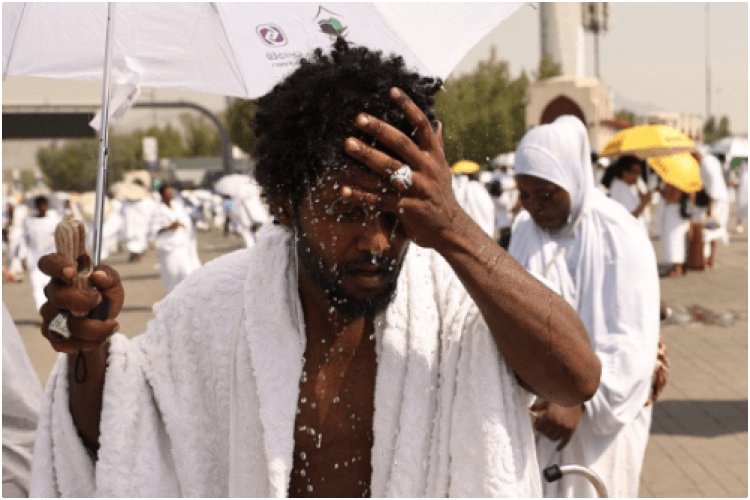Hajj Tragedy: Over 550 Pilgrims Perish in Scorching Heat, Majority Egyptians
Hajj Tragedy: Over 550 Pilgrims Perish in Scorching Heat, Majority Egyptians

Hajj Tragedy: Over 550 Pilgrims Perish in Scorching Heat, Majority Egyptians
In a heartbreaking turn of events during the annual Hajj pilgrimage, tragedy struck as over 550 pilgrims perished due to scorching heat, with the majority of the victims being Egyptians. The incident occurred amidst the intense rituals and soaring temperatures that characterize the pilgrimage to Mecca, Saudi Arabia, one of the holiest sites in Islam.
The pilgrimage, a fundamental pillar of Islam, draws millions of devout Muslims from around the world each year. It involves a series of rituals and prayers performed over several days, culminating in the symbolic stoning of pillars representing Satan. The sheer scale of the event, combined with the extreme heat prevalent in the region, poses significant challenges for organizers and pilgrims alike.
The recent tragedy unfolded as pilgrims faced extreme heat conditions, exacerbating health risks and leading to a surge in medical emergencies. Reports indicate that the victims succumbed to heatstroke and related complications, overwhelmed by the harsh environmental conditions despite efforts to provide medical assistance on-site.
The majority of those who lost their lives were reported to be Egyptians, underscoring the devastating impact on a community that had traveled thousands of miles to fulfill their religious obligations. The loss has reverberated across Egypt and the broader Muslim world, prompting expressions of grief and solidarity from religious leaders, government officials, and communities affected by the tragedy.
In response to the crisis, Saudi authorities swiftly mobilized emergency services and medical teams to provide aid to those in distress. Ambulances and medical personnel were deployed to the affected areas to evacuate and treat pilgrims, underscoring the critical role of preparedness and rapid response in managing large-scale incidents during the Hajj pilgrimage.
The incident has renewed calls for enhanced safety measures and precautions to protect pilgrims from the challenging environmental conditions they face during Hajj. Measures such as improved crowd management, better access to cooling facilities, and increased medical personnel and equipment are being emphasized to mitigate risks and ensure the well-being of pilgrims.
As investigations into the tragedy continue, attention remains focused on supporting the families of the victims and providing necessary assistance to those affected by the loss. The Hajj pilgrimage, while a deeply spiritual journey for Muslims, also underscores the need for meticulous planning and comprehensive measures to safeguard the health and safety of participants amid the rigors of the pilgrimage and the climatic conditions of the Arabian Peninsula.
The loss of over 550 pilgrims, predominantly Egyptians, in the Hajj tragedy is a stark reminder of the challenges inherent in managing large-scale religious gatherings under extreme environmental conditions. As efforts continue to address the aftermath and prevent future incidents, the global Muslim community mourns the lives lost during this solemn journey of faith to Mecca.
The tragedy struck hardest among Egyptian pilgrims, highlighting the devastating impact on communities that had gathered from afar to fulfill their religious obligations. Families and loved ones mourn the loss of those who perished, their grief compounded by the knowledge that their journey to Mecca, a pinnacle of spiritual fulfillment, ended in tragedy.
In response to the crisis, Saudi authorities mobilized swiftly to manage the emergency, deploying medical teams, ambulances, and support services to assist the pilgrims in distress. Despite these efforts, the scale of the tragedy underscores the need for enhanced safety measures and comprehensive planning to mitigate risks during such mass gatherings.
As investigations into the incident unfold, questions arise about the adequacy of preparations and the capacity to respond effectively to emergencies of this magnitude. Calls for improved infrastructure, better crowd management, and more robust health and safety protocols echo within the Muslim world and beyond, seeking to prevent similar tragedies in the future.
The Hajj pilgrimage, a testament to faith and unity, continues to draw millions each year despite the inherent challenges. It remains a profound journey of devotion and spiritual renewal for Muslims worldwide, underscoring the need for continued vigilance and proactive measures to ensure the safety and well-being of all participants.

 shivani
shivani 



